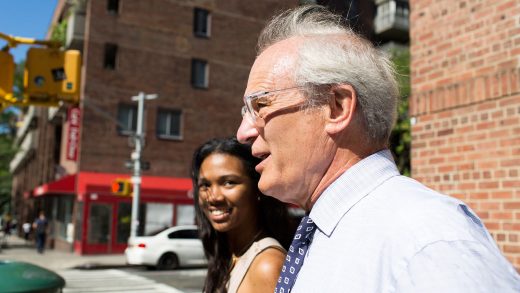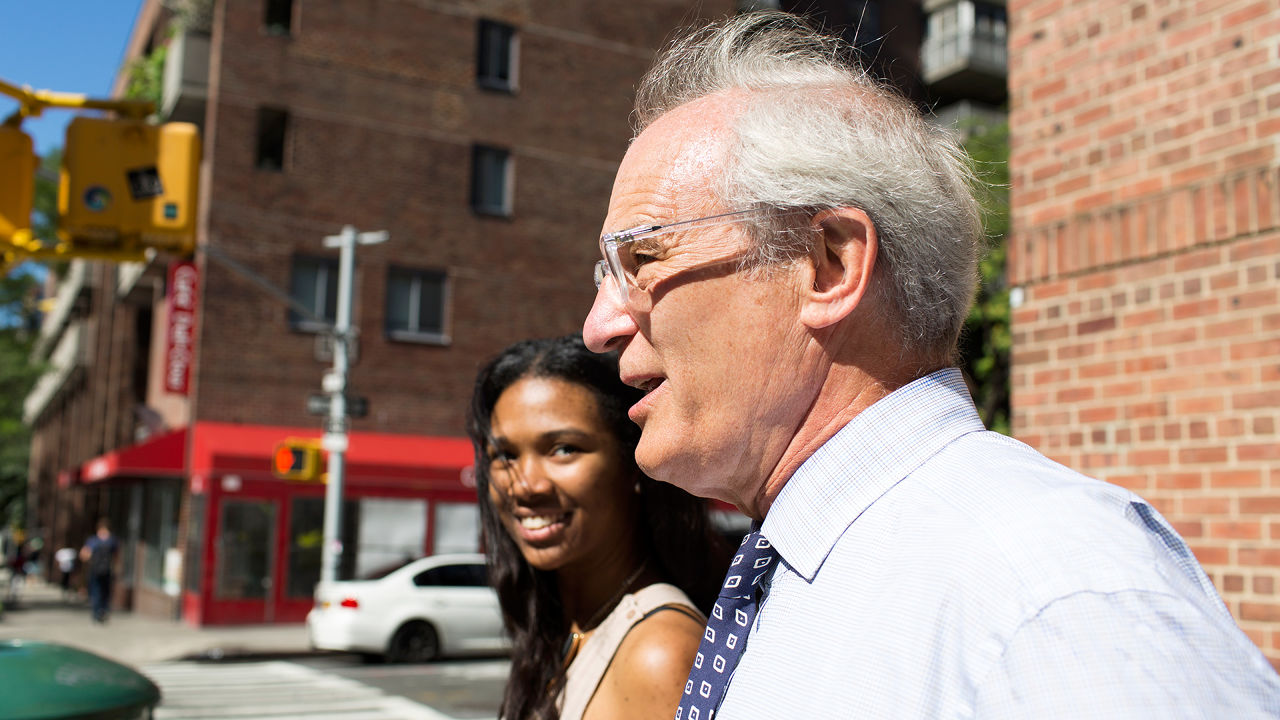This Retiree’s Summer Internship Was Pretty On Fleek
Paul Critchlow had earned his retirement. It was May of 2015, and he’d worked very hard over a long life, and as a young man, he had even fought in Vietnam. He went on to report for the Philadelphia Inquirer and served as spokesman for Pennsylvania’s governor. Finally, he’d spent the last 30 years at Merrill Lynch, half of those as its head of communications. Now that he was turning 69, it seemed like time for a rest.
The first feeling was euphoria. Paul went to Cuba with his eldest son. He walked Sag Harbor’s beaches with his wife, the novelist Patricia McCormick. A decade younger than Paul, Patty’s career remained quite active, and Paul began accompanying her around the world as she addressed audiences about her work.
But before long, Paul’s euphoria had worn off. In its place was a feeling of irrelevance.
Paul attempted work on a memoir he had begun some years earlier, but he wasn’t confident that his life story was worth telling at all. He had expected a few consulting gigs to materialize, but each fell through, for one reason or another. A friend told Paul he had to be more entrepreneurial, to create his own opportunities. But Paul didn’t feel like an entrepreneur. He’d spent his life as a company man.
One day, Paul complained to Patty that the internet wasn’t working, since he wasn’t getting any emails. She replied that her own email seemed to be working fine.
Sometimes, when Patty was out traveling or writing at a coworking space, Paul was left alone. He had no grandkids yet, and his children were less available than he might have liked. His daughter, in her 30s, lived across the country. His younger son was in his 20s and lived nearby in Brooklyn, but seemed busy. Their responses to Paul’s emails tended to be clipped, when they responded at all. Sometimes Patty gleaned intelligence on them from Facebook. But the social network seemed daunting to Paul, which he felt he was too old to join.
Months passed. Paul took to picking up litter each day along the side of the road in Sag Harbor. Neighbors saw him as they drove by, the gray-haired man in an orange safety vest, stooping to clutch another beer can in the pincers of a trash grabber.

One day last February, a friend invited Paul out for lunch. He had met Sally Susman some years before at a political fundraiser in Sag Harbor, and they’d hit it off. Sally, who in her mid-50s brought a mixture of toughness and warmth to her role heading up communications at the pharmaceutical company Pfizer, occasionally asked Paul to lunches like these, picking his brain for advice.
They met at Café Cluny in the West Village. Sally had a list of questions for Paul, which she diligently worked her way through. She was lobbying for a library renovation in Sag Harbor, which would require some political maneuvering. She picked Paul’s brain about some of the struggles to Pfizer’s image in the wake of adverse coverage of the high price of certain medicines.
Whether Paul noticed it or not, Sally was intensely nervous, because she was avoiding the real reason she had asked for a lunch with Paul. Finally she came out with it: “There’s something I’d like you to think about, and it won’t offend me if you say no.” She swallowed.
“Would you consider being my summer intern?”
In Sally’s recollection, Paul paused, as though to check his hearing aid. Sally quickly explained that she’d seen the Robert De Niro movie The Intern on a recent airplane flight, had been greatly moved by its portrait of a senior citizen intern working for an e-commerce startup, and wondered about making its concept a reality at Pfizer that summer. She had already cleared the idea with Pfizer’s human resources chief (he had also seen the movie on a flight).
Paul had only seen the trailer for The Intern, but the idea had charmed him as a movie premise. And now, he confessed to himself, even more so as the premise for his summer. What would it mean to have a gray-haired man moving about amid a sea of youngsters? Who stood to learn more from whom? Why shouldn’t the experiment be tried in real life?
“I just fell for it right away,” he later recalled.
That night, he went home and watched the movie, which reinforced his excitement. Soon, he told his wife, his kids, and several friends.
“Don’t call me to complain about being stuck in an office when I’m out on the beach,” Patty warned him. A friend was less diplomatic: “Are you out of your mind?”
As the internship approached, Sally asked Paul what he expected in compensation.
“What do the other interns make?” he asked.
“$18.25 an hour.”
Paul considered.
“That’ll be fine,” he said. His decades with Merrill Lynch left him without financial urgency. More to the point, he felt it was in the spirit of the thing to join the interns at their level.
To a certain extent. Wanting to impress his fellow interns and bosses, Paul went to Ralph Lauren and spent his entire projected summer earnings on suits.

Every summer, hundreds of college-aged students arrive at Pfizer for their first tentative steps into professional life—a scene echoed at countless other offices around the world. But the idea of a retired-age intern was unprecedented at any major corporation. Older people of course remain in the workforce in various ways, from the executive who just won’t step down, to the Walmart greeter who simply needs the money. In 2013, a 71-year-old advertising professor tried an internship at a branding firm called the Richards Group, in an effort to hone his teaching acumen. But experiments like the one in The Intern seem to be without high-profile precedent.
Pfizer’s corporate affairs division admits about 25 interns each summer, whose start dates are staggered. Most of them work in a windowless bullpen off a hallway on the 11th floor of Pfizer’s corporate headquarters in midtown Manhattan. But it was decided that Paul, when he arrived, would sit in a less cramped, adjacent room, sharing a table with three other interns.
The first of those three to begin his internship was Connor Sink, a cherub-faced rising senior at Ball State University in Indiana. On his first day, a supervisor told him that he’d be joined in a few weeks by a senior citizen intern, like in the Robert De Niro movie. “That’s really cool,” said Connor, though he was a little puzzled.
Soon, Connor was joined at the table by the second intern, Sarah Rekenthaler, a gregarious rising senior at USC. Sarah had also heard about the experiment. “Are you worried?” Sarah asked. “I’m kinda worried,” admitted Connor.
The following week, the third intern arrived: Sophie Spallas, a dry-witted rising junior also at USC. Together, the three went into full Google-stalking mode.
But “Paul Critchlow” wasn’t turning up on social media, with the exception of a sparsely populated LinkedIn profile. Connor became fixated on Paul’s service in Vietnam, for which he’d received a Purple Heart. Sophie was daunted by Paul’s profile photo, in which she thought he looked like a dictator. This guy is so terrifying, she thought.
Sophie marched down the hall and barged into the intern bullpen, which by now had filled with about 15 people. “Who watched the movie The Intern?” she asked. A few raised their hands.
One of them was Shalini Sinha, a petite and energetic graduate student studying at Georgetown. At 24, Shalini was a bit older than the other interns. She was also from across the world, having grown up outside Calcutta, India. She had spent the first week of her internship feeling out of place, not getting the other interns’ references to old American TV commercials (though she had seen The Intern a few months before). Exceptionally driven to succeed, Shalini mostly kept her head down, working in a far corner of the room, and frequently asking for more work from her supervisor.
Shalini listened to what Sophie had to say—the premise of the movie was about to be real, but at Pfizer!—but the rumor didn’t interest Shalini at the time. “I just didn’t register it,” she’d say much later, laughing.

Paul stepped into Pfizer’s lobby on Monday, June 6, wearing shoes he had shined the night before. After some agonizing over whether he might appear too formal, he had also opted to wear a tie and carry a briefcase. Paul had passed the drug test and completed the online modules required of all interns. But he was nervous. “I feel like the new kid in school,” he said.
Sally and Paul—both seasoned communications professionals—insisted that publicity was never the central reason for the internship experiment, but, they said, it smelled like a good story. Shortly before Paul’s internship began, they invited a reporter from Fast Company to shadow him through the summer.
In Pfizer’s lobby, Paul approached the check-in desk for visitors and announced himself to one of the guards. “I’m here . . . as an intern,” he said with a devilish grin.
The man checking Paul in did a double take. “Oh, an intern!”
Soon Paul made his way up to the 11th floor, where a supervisor showed him to the desk he’d be sharing with Connor, Sarah, and Sophie. The latter two were present.
“Nice to meet you, Paul,” said Sarah.
“I want that spot,” said Paul coolly. He was pointing at Sarah’s chair.
Red-faced, Sarah stood immediately.
“I was kidding!” said Paul.
A look of relief washed over Sarah. “Oh, I didn’t get it.” She laughed nervously.
“But that’s very nice. I’ll remember that,” said Paul. Then pointed at Sophie. “Actually, I want her seat.”
The rest of Paul’s day was a flurry of activity. An email from Sally to all the interns cast Paul as a mini-celebrity, and at a small reception at noon, he was swarmed by the other interns, as well as a few full employees. (Shalini got the briefest of handshakes, before Paul moved on to another group.)
Later, Paul took a small group of interns to a sushi lunch, where he shared a few war stories, metaphorical and literal. When he was about these interns’ age, Paul was recovering from shrapnel wounds from an rocket-propelled grenade attack in Vietnam, he told them. “Wow, you’ve had an interesting life,” said Sarah. “It kind of makes my Netflix after work seem pretty dry.”
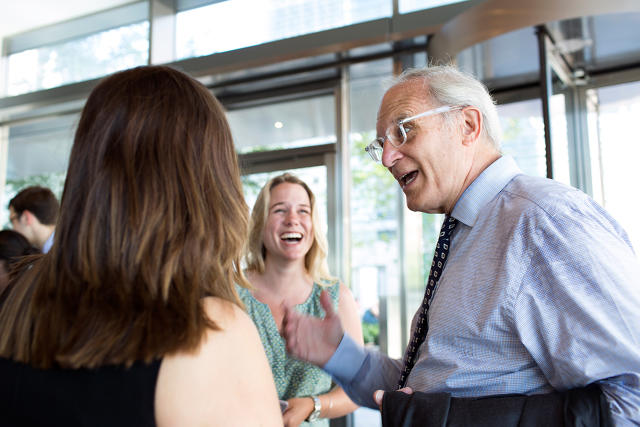
A meeting with Sally clarified the projects Paul would be working on through the internship. In many respects, much of Paul’s summer would more closely resemble a consulting gig befitting someone of his stature. Paul would advise Sally herself periodically, and Paul would write a few pieces for a Pfizer website called Get Old, which attempts to portray aging in a more favorable light.
But as with any internship, the hope was that Paul would get as much as he gave—that he’d be learning something. Sally asked that Paul prepare to give a few presentations about his career to the other interns. That way, Paul would get a chance to hone his communication skills for an audience decades his junior. It was also decided that Paul’s fellow interns would help him learn social media, a prospect that still daunted Paul.
Near the end of the day, Paul set a last tentative goal. An intern explained to him what a “man bun” was. “Maybe I’ll try to grow one this summer,” Paul deadpanned.

Shalini Sinha is not tall, and usually makes an effort to be at the front of group photos.
But on the second day of Paul’s internship, when a supervisor herded a number of interns together for a photo, the group happened to coalesce with Shalini in the back, right next to Paul. They all stood still for a moment, smiling for the photo, Shalini craning her neck slightly to be seen. Then, once the photo was taken and the group’s ranks began to break, Shalini steeled herself and turned to face Paul.
“Hi Paul, I’m Shalini,” she said. “You probably don’t remember me. Would you be my mentor?”
(“All in one breath,” she’d recall later. “I don’t know what got into me.”)
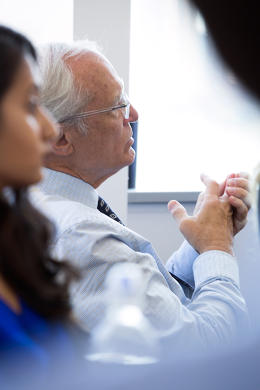
Paul was taken aback by Shalini’s directness, but also charmed. How could he say no?
A few hours later, the two met for coffee in Pfizer’s cafeteria on the second floor. Paul apologized in advance: He would have to run to a haircut scheduled in an hour.
Shalini explained that she’d had another mentor who had recently retired and grown unresponsive. She told Paul about an inner conflict: Shalini had fallen for New York ever since first setting eyes on (and Instagramming) the Empire State Building. She wanted to make her career here, but she worried about offending her father, who hoped she’d return to India.
Paul immediately sensed Shalini’s strong drive to succeed. Paul shared his own stories about how moving to New York had also been a challenge, but had unlocked his own ambition. “You want to be the best at what you do, and there’s no place where that can happen more meaningfully than New York.”
Engrossed in their conversation, Paul missed his haircut.
Ambition had recognized itself. Asked later about what surprised her about her relationship with Paul, Shalini said, “how similar we are.” Then she laughed, because she knew they couldn’t be more different—in gender, in nationality, and, of course, in age. “We have literally nothing in common . . . but we’re so similar.”

“We’re all interns. No one needs to be nervous,” said Paul, sitting near the head of a table in a packed conference room.
It was a Tuesday in late June, a few weeks into his internship, and Paul was the one who had reason to be nervous. Today was the day of his first “lunch-and-learn” presentation. The group of 25 communications interns had filed into the room a few minutes before, having been promised free pizza.
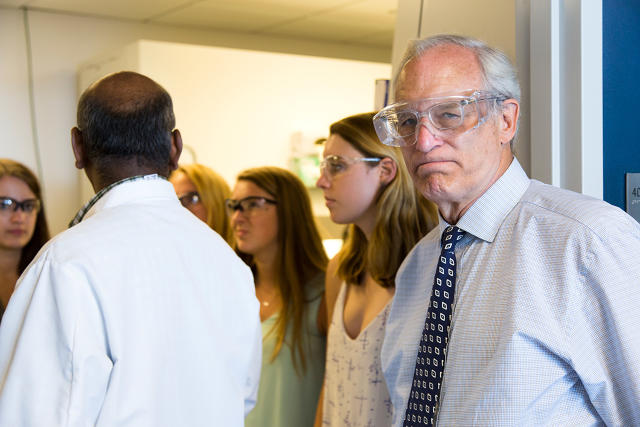
Related Video: Pfizer’s Senior Intern Program Is Retiring Old Age Bias
Though Paul had by now gotten to know a handful of interns fairly well, most remained strangers. All were about five decades younger, making this his first real test of whether he could engage a room full of millennials.
Paul started out by explaining that he and several interns had nicknames for each other. Connor was “Sink” and Sarah “Shrek,” after their last names, while Sophie was “Soap.”
“And I’m Critch,” he said. “You can call me Critch.” There were a few uncomfortable titters.
Paul pressed on: “My, uh, my old boss was a man named—he was the governor of Pennsylvania—Dick Thornberg. And he once said the ‘threshold requirement’ for success of any elected official is the ability to manage a crisis, and manage it well. And I think the same thing is true of corporations,” Paul said.
Off to a rickety beginning, Paul’s presentation soon picked up. Paul, it turned out, had been the governor’s press secretary during the 1979 Three Mile Island nuclear accident, a scene of frenzied panic. Paul and the governor had managed to keep cool heads and avoid a premature evacuation that might have harmed many people.
It was a riveting story. But soon the presentation lost its focus. Paul digressed into a lengthy discussion of the Deepwater Horizon oil spill disaster and the ensuing public relations effects. (He had had nothing to do with that.) His PowerPoint slides, with their default color schemes and fonts, were somewhat dull. And since Paul had chosen to sit tucked away at one corner of the table, he was difficult for many in the room to see—just a gravelly voice to tune in to or out of while they munched free pizza.
Then he started to talk about 9/11. At the time, he had been the communications chief for Merrill Lynch, whose office stood not far from the Twin Towers. He was in a meeting that morning when he heard a loud boom. Turning in his chair, he saw a gaping, flaming hole in North Tower, knowing immediately he was witnessing a hostile act.
“I think my experience as a combat veteran helped guide me that day,” he said. “I found myself detaching from my emotions, and concentrating on what needed to be done.” Paul said that a crisis “separates the men from the boys, and the women from the girls.”
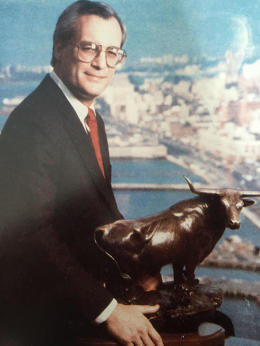
Merrill Lynch’s executive team ordered an evacuation of the building, and soon Paul and the other executives were making their way north to a contingency office space. As they moved through the streets, they heard a rumbling sound, and saw the spire of the second tower begin to sink. “The cloud was just about to engulf me and the others, when a huge wind came up from the river—in my mind, like the hand of God—and stopped the cloud about 100 feet from us,” Paul said.
At the contingency space, there were reports of a gas leak. So Paul improvised, inviting his group of 25 or so colleagues into his West Village townhouse.
“Patty was so happy to see me; she took it all in stride,” said Paul. Their son had stayed home sick from work that day, and their 18-year-old daughter had been slated to fly that very afternoon to begin college. But there was no time for a big family reunion, and soon Paul and his colleagues began running Merrill Lynch to the best of their abilities off of Paul’s five landlines.
Here Paul’s story became curious. A 60 Minutes reporter wandering the neighborhood that morning showed up at Paul’s home, and Paul stepped out to give a comment. “Instinctively, I made a point to say two things, to try to sound confident.”
Paul pressed a button, bringing up a new slide in his presentation, filled entirely with the following quote in large font, which he read aloud:
“Our priorities: first, to account for all of our employees. Second, to get the business up and running for the clients . . .”
Paul seemed to present this moment as something like heroic, but an awkward silence seemed to settle over the room. To some, Paul’s focus on business in the midst of a national tragedy—amid big new questions about what mattered and what didn’t—clearly seemed a bit tone-deaf.
Paul opened the floor to questions. He’d previously told Sophie, Connor, and Sarah that he expected to field a few light questions about how the crises he’d faced might differ in the age of social media. Instead, a tall, serious intern named Zack raised his hand, asking about Paul’s comment to the 60 Minutes reporter.
“I understand the necessity of getting back to business,” asked Zack, “but also Merrill Lynch is a company made up of human beings and, like everyone else in the nation, was grieving. So how did you toe the line between being bullish in the business sense while also being compassionate and realizing people needed to recoil from 9/11?”
Paul seemed taken aback by the question. “Those were the two handrails all along the way,” he said, sputtering a few examples of how Merrill Lynch balanced its business with compassion, by offering group therapy sessions for employees, for instance. He continued for a minute, concluding, “It’s a great question, but other than by giving some examples, I can’t tell you . . .”
The room was quiet a moment. There was more to the story of Paul’s 9/11 experience, a more personal story that, he told me later, he would have liked to have shared with the group, if he’d felt more comfortable.
But as it was, Paul’s first lunch-and-learn had taken a slightly somber and strange turn, and no one seemed to know what to ask next.
Finally Sophie raised her hand.
“Yes, Soap!” said Paul.
“I was thinking,” offered Sophie, “about how much different Three Mile Island would be today with social media.”
Paul looked relieved. “Wow, that’s what I wanted to ask you,” he said.

As the summer progressed, Paul intensified his study of millennials, the way they thought, spoke, and behaved. His first subjects were Connor, Sarah, and Sophie, whom he took out to an Italian restaurant in the West Village. All three would remember that evening as the turning point in their relationship when they began bonding with Paul more as friends than colleagues.
At the office one day, the group got into a spirited discussion of memes and other millennial forms of expression. They taught Paul that to say “bye, Felicia” in a certain tone amounted to a curt and denigrating dismissal (though none were quite aware that the phrase had a source other than the internet). They taught him the phrase “on fleek,” explaining that it expressed a certain overall goodness of a thing; for instance, one might utter it in praise of a woman’s eyebrows.
One Thursday in early July, Paul was walking down the street, when he excitedly spotted a poster advertising the ride-share service Gett.
“$10 to go anywhere in Manhattan,” read the ad. “That’s tight AF. Right, on-fleek millennials?”
He snapped a photo on his iPhone and sent it proudly to the group, which responded encouragingly at the find.
Then Paul texted a follow-up: “What’s tight AF?” (They told him.)
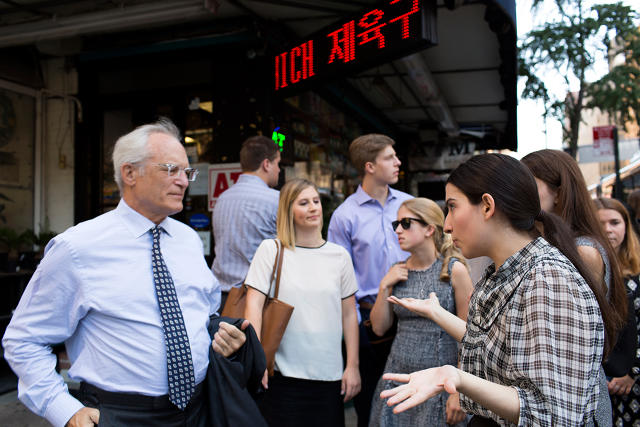
A few days later, Paul made good on his plan to confront his fear of Facebook. He sat down with Shalini in the cafeteria, while they pulled up his profile, which a colleague helped him create a few weeks before.
“You’re so popular! You have like nine friend requests!” said Shalini.
“Well, it’s just ‘cause I’m new,” said Paul.
The two began scrolling through Paul’s news feed. Shalini taught Paul how to like a picture of his niece. “Your first like!” said Shalini.
But soon they encountered a post that caused Paul some anxiety. “This is the son of a friend,” he explained, pointing to the post. Paul explained he’d been on Facebook earlier and had seen this young man, who does standup comedy, make a joke about a recent mass shooting.
“I don’t want that on my Facebook,” said Paul. “I don’t want somebody to see that I accepted or allowed that. So I unfriend?”
“Social media doesn’t work like real life,” explained Shalini. “In real life, if you’re sitting at a table with someone who’s being mean and nasty, if people see you keeping company with that person, they’ll judge you . . . On social media it’s different. Just because you’re friends with someone and he says something, it doesn’t reflect poorly on you.”
“But if I have agreed to friend somebody, and they enter my account, don’t they see all this . . . trail of people talking?”
It became clear that Paul had conflated his news feed with his profile. He thought that everything he saw in his feed, his friends would see, too, and associate with him. The idea daunted him.
“No,” Shalini said. She explained that his Facebook friends didn’t see his feed. And no one would judge him for the behavior of his digital associates.
“Ohhhh,” said Paul. “So it’s not as frightening as I thought.” He let out a relieved laugh.
Paul kept scrolling. “Fuck . . . Jerry?” he inquired of a humorous photo reposted by a niece. Shalini just laughed.
Paul scrolled further and further down his news feed, persisting even though he seemed to be growing fatigued. “I just want to see when it comes to an end,” he said. He scrolled down once more, but the feed kept repopulating with fresh material, again and again and again. Paul’s eyes widened. “Oh my God, it keeps bouncing up! How long does it go?”
Shalini explained there wasn’t really an end to the news feed. It stretched back as far as the posting histories of his friends. “I love the kind of questions you ask,” laughed Shalini. “They’re so new to me. I never thought, when I keep scrolling, at some point it should end.”
“How can it never end?”
“You start ignoring things, only looking at the things that matter to you.”
“It felt manageable,” said Paul. “I had a notion . . . that it was not infinite.” He stared at the glowing laptop screen for a moment, looking daunted again. “But the rabbit hole never stops.”
“It doesn’t,” said Shalini.
Paul thought a moment. Then the worry seemed to lift from his face.
“Now I’ve learned that . . . I can impose my own stop orders on things,” he said.
Shalini smiled. “You can.”
One evening, Paul stayed late at the office, when he saw Shalini alone in the intern bullpen, absorbed in extra work she had solicited from her supervisor. He muttered a few words to Shalini about the importance of striking a balance between life and work, encouraged her to think about imposing her own stop order. But Paul’s words didn’t seem to register. The two said goodnight, and Paul went on his way.

“Spokespeople come in all shapes and sizes,” said Paul. It was a Thursday in mid-July, one of the last weeks of his internship, and this was Paul’s second lunch-and-learn, a second chance to engage an audience of millennials with his story. Already, his presentation had a different vibe: Paul was standing at a lectern near the screen, not sitting in the corner.
“Here are some examples,” Paul began, clicking through images of various spokespeople: the Geico gecko, the Aflac duck . . . and an unrecognizable young man with a giant, bushy mustache. “Yes, that’s me,” he said.
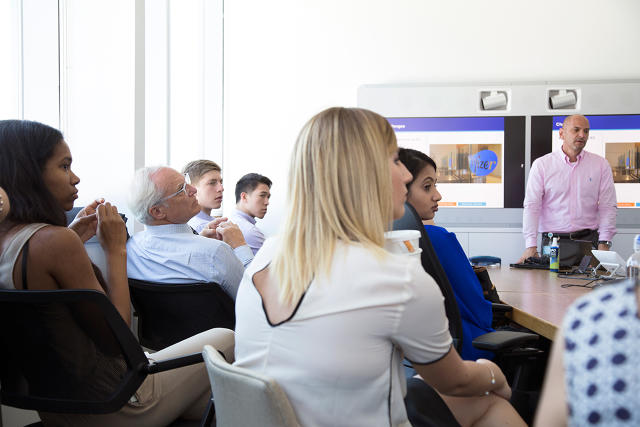
Paul had consulted with Connor, Sophie, Sarah, and Shalini on this presentation, and the results were apparent from the first slides. His PowerPoint game was strong, with stylish design and adept comic timing.
“Rule number one: Never lie,” said Paul, launching into the next slide. “Here’s a quiz. Say you learn that during clinical trials a prominent new drug is showing some serious side effects for its users. The trials are not completed yet. A reporter has been tipped and calls you for comment . . . What should you say to the reporter? One: ‘It’s none of your business.’ Two: ‘No, the tests are going fine.’ Three: ‘We’re having some issues, but it’s early.’ Four: ‘I’m not in a position to comment right now. I’ll get back to you as soon as possible.’”
“Four,” the interns all chimed in. The room was already on board.
As Paul’s talk progressed, the audience only became more engaged. Paul shared further rules—about maintaining credibility, about the need to understand your company’s culture, and about the art of keeping journalists at arm’s length (“David, I apologize,” he said)—with quizzes to illustrate each rule.
If Paul’s first lunch-and-learn belonged in the Wall Street Journal, this second one would feel right at home on BuzzFeed.
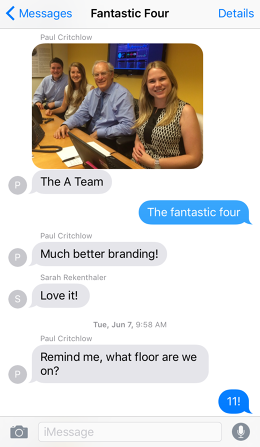
The fourth quiz presented a scenario where a reporter calls you, the spokesperson of an imaginary company, claiming knowledge that the CEO is in trouble with the board of directors. The possible responses were “Let me get back to you,” “No comment,” “I never comment on rumors,” and “That’s baloney, the CEO’s tight AF with the board.”
The room full of interns erupted in laughter. Sally Susman, sitting along the wall, leaned over to a colleague. “What’s tight AF?” she asked. The colleague blushed, then whispered a sanitized explanation.
When the presentation ended, it was met with strong applause, followed by an energetic question-and-answer session. And when it was all over, the tall, serious intern named Zack approached.
Zack made his right hand into a fist, then held it outstretched toward Paul. Paul looked at it for a moment, made a fist, and bumped it back.

On August 11, the last day of Paul’s internship, I found him sitting alone at the desk he had once shared with Connor, Sophie, and Sarah. Just as their internship start dates had been staggered, so had their end dates, and Paul’s was last. Paul had bid goodbye to each of them the week prior, just after they threw him a surprise 70th birthday celebration.
Among the few interns who now remained was Shalini, and she and Paul convened again in the cafeteria for a last meeting. Shalini had a hope that she might see Paul again later that summer, but Paul explained he’d be in Sag Harbor through Labor Day. “But I learned how to FaceTime,” he said.
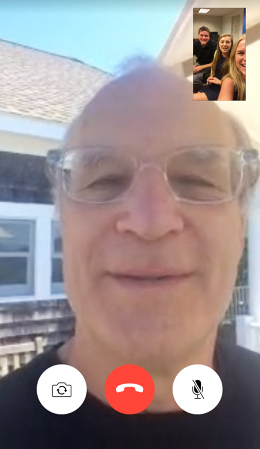
The discussion turned again to Shalini’s striving. Though Paul had begun the summer a happy cheerleader for her ambition, he’d begun to have second thoughts after seeing her working late nights.
“We had a discussion,” began Paul, “and Shalini openly stated, ‘Work will be my priority. And my boyfriend knows it.’ And I said, what’s important is that you make a conscious decision, and not just drift into workaholism, which is what I did.”
“Maybe by my thirties, I’ll strike the right work/life balance,” she said. “And also be CEO,” she added.
“It’s just being mindful,” said Paul. “By the way, this is the pot calling other kettles black. I was not mindful.”
And here Paul shared with Shalini for the first time the fuller story of why 9/11 was in so many respects a watershed day for him. It was true that he had witnessed horror that day, true that he had projected bullish confidence for Merrill Lynch, and true that Patty had been happy to see him at the moment he filed into their townhouse with 25 colleagues. But there was more to the story.
“We operated out of my town house for six or seven hours,” he said, resuming the story from where he’d left off during his lunch-and-learn. “Then we went to another facility Merrill Lynch had, stayed there till three or four in the morning. I came home, and my wife said, ‘Can we take a walk?’ I said, ‘No. I’m too tired, and I have to get up early and get back to work.’ That was wrenching for her, because it was me saying to her that my job was more important than my family.”
September 11, 2001, also happened to be Paul and Patty’s 19th wedding anniversary. But Paul’s choices that day opened a rift in their marriage. Soon, Patty packed up and left. They remained separated for almost two years. They were only able to heal once Paul chose to step down from the chief communications post at Merrill Lynch into a less demanding job. It had taken him almost his whole life to figure out how to balance his work and his personal life, and had nearly cost him his most important relationship. This summer, while scratching his itch to work again at Pfizer, he had still taken care to set boundaries, declining to log in remotely and carefully monitoring his hours.
Of 9/11 and its aftermath, Paul summed up: “That could have been the end for our marriage.”
A few moments passed.
“Paul,” asked Shalini. “Do you think I’m gonna become that?” Her own relationship with her boyfriend, she said, had at times been strained this summer by her work.
“Please don’t,” Paul said.
“Will you remind me when I become like that, not to be that person? Please remind me.”
Soon it was time for Paul to pack up and head to Sag Harbor.
“I wish I could chill at the beach,” said Shalini.
“You will when you’re 70,” said Paul.
“No, my goal is to become a senior intern when I’m 70.”
En route to Sag Harbor, Paul stopped off with Sally at an event for Pfizer retirees. Together, they shared with the retirees the story of Paul’s summer internship. For once in this upside-down summer, Paul found himself surrounded by a sea of gray-haired people like him.
Finishing his presentation, Paul opened the floor for questions from the retirees.
He called on the first raised hand he saw. The man of about 80 asked, “How can I apply for your position?”
Paul smiled and shrugged and turned to his supervisor.

Sally hasn’t decided just yet whether Pfizer’s senior internship will resume next summer. Several of Paul’s features—his easy demeanor, his comfortable financial status, his pre-existing friendship with Sally—raise questions about how easily his success this past summer could be replicated. “We had a couple of unique conditions that were very favorable to a positive result,” concedes Paul.
But as the number of restless retirees like Paul rises—the population of seniors in the U.S. is forecast to nearly double over the next three decades, growing from 48 million to 88 million by 2050—both Sally and Paul say that they hope his story can serve as a template for others. They argue there are real advantages to a senior internship over intergenerational mentorship programs that companies might already be attempting. There’s just something about a “one-time, unique, neutral source of career advice,” says Paul.
For his part, Paul says the internship invigorated him. Inspired by the response to his later lunch-and-learns (of which he delivered several more in his internship’s final weeks), Paul says he has a new confidence that his life is worth writing about. He plans to throw himself back into his stalled memoir. He signed up for a Sag Harbor writers’ group, which he plans to begin attending after he returns from a family vacation.
Paul says he also gained confidence about pitching himself for communications consulting gigs. “I think I got a sense that I can be entrepreneurial,” he says.
I related Paul’s story to the writer and director of The Intern, Nancy Meyers. It’s “the kind I love,” she said, “one with a happy ending.”
Paul might contest that wording, because he feels like his story is far from over. “I now am closer to knowing where I’m going. And I’m ready to get started.”
Fast Company , Read Full Story
(22)

